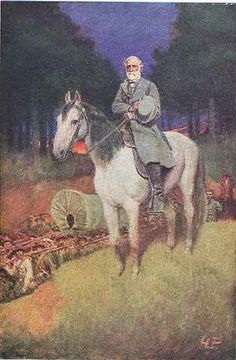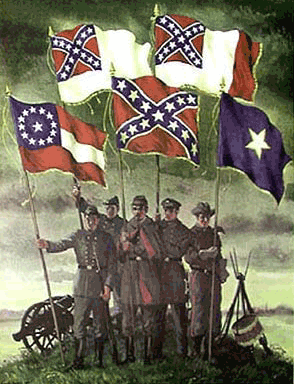Fredrick Jameson sat on the foot of his bed, a small writing desk propped on his knees. His pen moved quickly across the page, leaving a trail of words inter-spaced with a certain amount of ink blots. If one had compared his letters to his grandfather with his grandfather's letters to himself, the similarity of the spidery handwriting liberally dotted with blotchs may have amused them...or horrified them.
Dear Grandfather,
I have just been speaking to Charles Clark. He is from New York and between him and myself, we cause quite the stir. He nearly died with laughter last evening for he was attempting a "Southern" accent and with his very pronounced Yankee accent, he simply could not manage. I do believe he found more hilarity in his failure than anyone else.
However, I did not bring up Chuck to tell you how terribly he manages an Alabama accent. I was talking to him but last night of your letters concerning the late war and he became very interested. He has a serious side, though one sees very little of it. He told me that he had a great-uncle who fought for the "rebels". I shall try to write it as he told me.
"I had no idea that I even had a great-uncle until this past summer. I was visiting my grandmamma and was grubbing around in her attic. I found a picture of a young fellow and I asked her who it was. She told me, after thinking for a good while, that it was her brother. I pursued the subject and she finally told me that he "had gone to fight with the Rebels". He was killed, it appears, someplace in Kentucky."
I was unaware, Grandfather, that any Northerners joined our cause; I find it most fascinating. Chuck is interested in hearing "the other side". He wants to know why this uncle he never heard of went off to fight and why it was such an issue that all this time later, his grandmother would say stiffly, "It is probably best that he was killed". However, I do suppose it would be rather troublesome to be seen as a traitor in one's home town.
What I mean to say, Grandfather, is that I shall be sharing my letters with him. We shall trace battles and troop movements together with the maps that he went out and "scarfed" from one of our instructors. I do hope he asked permission to use them first.
We are looking forward to your next letter with eagerness!
Your affectionate grandson,
Fredrick
Mr. Hamilton look pleasantly surprised at his grandson's excited, somewhat incoherent letter. He nodded in approval and reached for his pen...
My dear Fredrick,
It pleases me immensely that your friend should have an interest in our history! Yes, indeed, there were Northerners who joined us in our fight. State's rights, my dear lad, was not just a Southern issue.
There were several seemingly minor incidents that took place on the 11th of November.
In the West, CS Major General George Crittendon, a native Kentuckian, was assigned the command of the District of Cumberland Gap. In Columbia, a 128 pound gun accidentally exploded. (Do not require me to tell you how that happened, Fred, for I do not know.) The explosion killed five men and wounded none other than the General Polk!
The only military actions to take place that day was between the Jayhawkers of Kansas and Missouri secessionists at Little Blue River, Missouri and the battle of New Market Bridge in Virginia.
I beg your forgiveness for the shortness and lack of interesting facts...but I have not had the time to do the research I wished to.
More tomorrow,
Your loving Grandfather,
James Hamilton

 RSS Feed
RSS Feed

